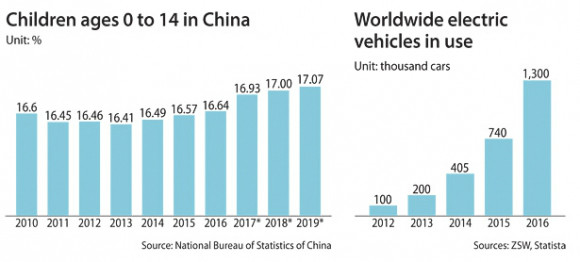Trade agency details 2017 trends: China and green
The elimination of China’s decades-old “one child” policy is expected to create new opportunities for Korean toy and children’s product makers, while the worldwide emphasis on environmental protection is expected to generate more demand for electric cars and environmentally-friendly buildings, which could benefit Korean manufacturers. These are just some of the strategies and trends outlined in the Korea Trade-Investment Promotion Agency’s annual report for how Korean companies can take advantage of newly emerging opportunities across the world next year, based on data collected from its 33 trade offices in different countries.
The end of China’s population control policy, perhaps the most infamous in the world, in 2015 is expected to be a boon for Korean manufacturers of children’s products, as the younger population of its giant neighbor will grow in coming years. “As the safety of children’s products made in China is dubious after the melamine-tainted powdered milk scandal [in 2008], parents are looking for quality import products,” said Ro Hyun-joo, who works at the Korean trade agency’s Hangzhou office in southeastern China. As China’s third-largest trading partner, Korea has a good chance of banking on the opportunity. Exports of Korean children’s products amounted to $230 million in 2015, a jump of 5.8 times from five years prior, according to data from the Korea Customs Service. “The popularity of Korean pop culture in China and the influence of successful television programs like ‘Dad! Where are We Going?’ [a reality show where children and their fathers go on trips together] may have spurred Chinese interest for Korean child care goods,” Ro said.
Prospects are also good for Korean companies hoping to enter countries like Paraguay, the Philippines and Vietnam, the report said. In particular, Paraguay’s “Maquila Program,” which allows foreign factories to import certain materials and equipment tariff-free and then export finished goods, is a notable business opportunity that could help Korean companies’ entry into Latin American markets. In terms of worldwide trends, the trade agency pointed to increasing demand for environmentally-friendly products, including electric bicycles, vehicles and green buildings. Germany, with its strong automakers, has accelerated development of electric cars. Volkswagen is working toward releasing over 20 electric vehicle models by 2020 and replacing 25 percent of its cars with electric ones.
Korean automakers Hyundai Motor and Kia Motors have released the Ioniq and Niro but they are still in the early stages of development. Korea itself lacks the infrastructure to ramp up development. While there are around 80,000 electric vehicles registered in Korea, the number of fast charging stations nationwide is less than 500 units. Compared to the United States, where there are 6.6 vehicles per charging station, and China, where the number is 3.8, there are a whopping 17 electric vehicles per station in Korea. “Koreans have a competitive edge in battery-making technology and so we expect Korean companies to leap into the electric mobility business in the future,” said Lee Ho-bin, a Korea Trade-Investment Promotion Agency employee in Germany.

'Study > English' 카테고리의 다른 글
| China closes door on Korean entertainers (0) | 2016.11.24 |
|---|---|
| Adoptee arrives in the home he doesn’t know (0) | 2016.11.23 |
| Korean start-ups lacking diversity (0) | 2016.11.21 |
| A Different Kind of Fantasy (0) | 2016.11.18 |
| Cho secures her first season title at KLPGA (0) | 2016.11.17 |
